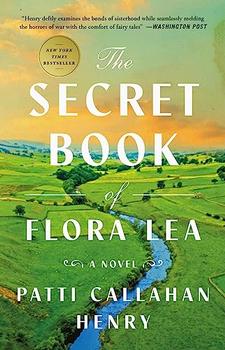Book Club Discussion Questions
In a book club? Subscribe to our Book Club Newsletter and get our best book club books of 2025!
For supplemental discussion material see our Beyond the Book article, The Imaginary Worlds of Childhood and our BookBrowse Review of The Secret Book of Flora Lea.
Please be aware that this discussion guide will contain spoilers!
- Hazel and Flora Lea's childhood experience was inspired by Operation Pied Piper—a real life event in British WWII history in which over three million children were evacuated from their homes to live with volunteer families throughout the English countryside. Were you familiar with this piece of history prior to reading the novel?
- Hazel takes great care of the rare books while employed at Hogan's Bookshop, wearing white gloves and logging items meticulously. In passing, the owner, Edwin, has mentioned the enormous value original illustrations can add to a book. What is revealed about Hazel's character in the decision to take the copy of Whisperwood and the River of Stars along with the illustrations? What about when her initial denial of taking them is factored in?
- When Hazel makes the phone call to Peggy Andrews seeking information about the book, she gets an unexpected answer about the origin of Whisperwood and the River of Stars. What does this broadly say about the creation of storytelling and mythmaking? Can someone ever own a story?
- Bridie Aberdeen, as a character, is presented as extremely warm and nurturing yet with some eccentricities. The town gossips about her practices and the "mysterious" disappearance of Henry's father. What was your first impression of Bridie? Did that change at any point during the book?
- Hazel and Flora's mother had several opportunities to take her daughters back to London but ultimately made the decision that they were safer and better served in Binsey with Bridie and Henry. Do you have a positive or negative opinion of their mother? Would you have made a different choice?
- Only through an honest conversation years after the fact do Hazel and Henry discover their shared guilt over what happened to Flora. Would that silence have lasted as long if Hazel and Henry were older when Flora first disappeared?
- Barnaby is supportive of Hazel's desire to reach out to Peggy Andrews and even encourages her to get in touch with Dorothy Bellamy, thinking a reporter may be able to help, yet he eventually struggles with Hazel's never-ending quest and its effect on their relationship. Does Barnaby's ultimatum change your view of the character? Did Hazel take her quest too far?
- How did you feel about the reveal of Dorothy Bellamy's past? Did Dorothy's Aunt Imogene have justification in her decision to remove the child the way she did?
- How do the specific time periods—World War II and 1960—affect the way in which the case of Flora's disappearance was handled? Would the outcome have been different if set in present day?
- At the end of the story, Dorothy (Dot) is coming to terms with two versions of herself. What are the broader implications of childhood memory? Why do we so clearly remember some things and not others, regardless of importance? Can you think of your earliest childhood memory?
- Hazel's character displays many different emotions in the decision making throughout her life—hope, fear, guilt, love. Which one do you think is the dominant driver? Would it be the same if you were in her shoes?
- The Secret Book of Flora Lea weaves an ode to stories and, ultimately, how we carry them with us throughout our lives. Is storytelling a universal way for humans to connect? How has storytelling affected your life?
Enhance Your Book Club
- Seek out a map of England and chart the train journey of Hazel and Flora from London to the real-life village of Binsey in Oxfordshire.
- Enjoy a tea service: a selection of English breakfast, Earl Grey, or green tea with sugar and milk options on the side. Add it some tea biscuits or scones with butter and jam as a food option.
- As children, Hazel and Flora become enraptured with the story of Whisperwood. In the spirit of the novel, share a memorable book or story from your childhood.
Unless otherwise stated, this discussion guide is reprinted with the permission of Atria Books.
Any page references refer to a USA edition of the book, usually the trade paperback version, and may vary in other editions.
